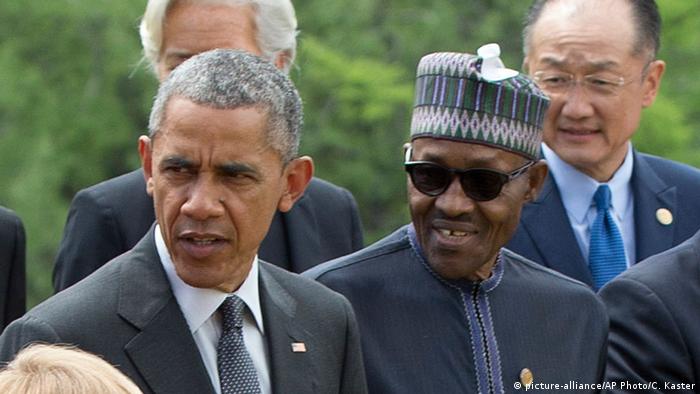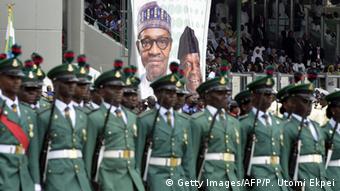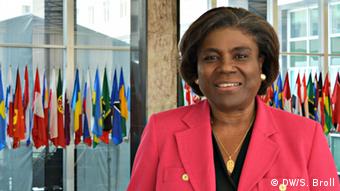Nigerian President Muhammadu Buhari is to meet President Obama in Washington to discuss the fight against Boko Haram. Nigeria's new head of state will be seeking to convey the message that he is a reliable partner.
"Nigeria is potentially Washington's most important African ally," Peter Pham of the Atlantic Council told DW. "I say potentially," he added "because that potential has not yet been realized."
One reason for this is Nigeria's poor image in the US. According to Richard Joseph, Africa expert with the Washington-based Brookings Institution, Nigeria is seen as "largely corrupt, they think of it in terms of chaos." Above all, Nigeria is being shaken by a seemingly endless series of attacks by terror group Boko Haram.
The new Nigerian president Muhammadu Buhari will have the opportunity to correct such a view during his visit.
Peter Pham expects the visit to mark a first step "in the renewal of the partnership between the United States and Nigeria." Relations between the two countries suffered considerably under Buhari's predecessor Goodluck Jonathan.
The talks will most likely center on the fight against Boko Haram. The alarm bells have been ringing in Washington since the group publicly announced it was allying itself with "Islamic State." More so since it expanded its attacks to Chad and Niger. "It is becoming increasingly a more virulent threat to regional security," Pham said.
Encouraging signs
From Washington's perspective, the new Nigerian leader could be the right man to foil Boko Haram's ambitions. At his inauguration at the end of May, the former general pledged to tackle the enormous challenges head on. In a sign that he means business, Buhari moved the military's operational headquarters for the fight against Boko Haram to the northeast of the country. Just a few days ago, he sacked the country's military chiefs, several of whom had been criticized by international organizations for alleged human rights violations.
Despite this, there has been no let up in the attacks. Every bombing or massacre of villagers in the north is followed by assurances from Washington that the US administration supports Nigeria in its fight against the Islamist insurgents.
Economic promise and reality
Buhari must use the visit to re-establish the trust that was lost while Jonathan was in power. "Once you have trust you could get greater intelligence sharing and military cooperation," Joseph from the Brookings Institution said. Nigeria's military lost much of its reputation in the eyes of the US and Europe as well as in neighboring countries, due to its perceived inefficiency. One result of this was the halting of the training of a Nigerian battalion by the US army.
In addition to the fight against Boko Haram, discussions will probably also focus on trade and economic cooperation. On paper Nigeria is Africa's largest economy and the continent's leading oil producer. But "the gap between Nigeria's economic promise and the reality is vast," said Joseph. Nigeria still has a long way to go with the development of its infrastructure, in areas ranging from generating electric power to the establishment of an efficient, functioning public transport system.
For countries such as the United States, Germany, Great Britain, Japan and China "there is a huge interest in seeing Nigeria really become what it can be economically."
Energy shortages are a massive hindrance to development in Nigeria. Reports are circulating in Washington that power production fell still further in recent months – despite the Obama initiative "Power Africa" to which the US contributed seven billion dollars (6.4 billion euros) two years ago with the aim of doubling the number of power connections throughout the continent.
There is also tremendous potential in agriculture, Joseph said. "There is so much unused land in Nigeria." Improving the level of productivity and modernizing the farming sector should be given greater priority.
The gay issue
Washington has noted with approval President Buhari's pledge to combat corruption. This was commented on by Deputy Secretary of State Antony Blinken on a recent visit to Nigeria. In the capital Abuja he met with representatives of a number of NGOs and said he saw a "vital role for citizens and civil society in the fight against corruption." They could help solve problems when the government on its own was unable to do so.
The Obama administration is concerned not only about corruption but also about human rights in Nigeria.
A recent article in The Daily Post Nigeria quoted US Assistant Secretary of State for African Affairs, Linda Thomas-Greenfield, who had criticized the discrimination of lesbian, gay, bisexual and transgender (LGBT) people in Nigeria. In a live web-chat with journalists in Washington, Thomas-Greenfield said that, alongside Uganda, Nigeria "had the hardest legislation on the gay community." She said the US would continue to press the Nigerian government and the legislature "to change the laws and provide human rights for all Nigerian people regardless of their sexual orientation." Under a law signed by President Goodluck Jonathan, Nigerian couples entering into a same sex union face prison terms of up to 14 years.
Buhari's visit comes shortly after the US legalized same-sex marriage in all its states. Peter Pham supports the stance of the US administration towards Nigeria but warns against unrealistic expectations. "Regrettably, this type of [discriminatory] policy enjoys considerable political popularity in Nigeria and so we have to recognize that we may not be able to achieve everything we would like to achieve in this regard," he said.





No comments:
Post a Comment